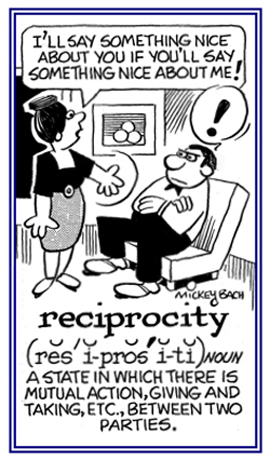reciproc-
(Latin: reciprocus, turning back the same way, alternating; turning backward and forward; to give, to do, to feel, or to show in return)
Another term for a piston engine: A reciprocating engine is one that employs one or more pistons to convert pressure into a rotating motion.
1. An action or an arrangement that involves two people or groups of people who behave in the same way or agree to help each other and give each other advantages: Sally was impressed with the reciprocation of kindness among her friends.
2. A returning, usually for something given: Mary wanted to invite her neighbor over for lunch as a reciprocation for taking her to the doctor's offie the week before.
3. A mutual giving and receiving: The two sisters thought that the reciprocation of giving each other Christmas presents every year was a great thing.
4. In prosthodontics, the means by which one part of an appliance is made to counter the effect created by another part: Prosthodontics refers to a dental specialty concerned with the restoration and maintenance of oral function by the reciprocation or replacement of missing teeth and structures by artificial devices or prostheses.
2. A returning, usually for something given: Mary wanted to invite her neighbor over for lunch as a reciprocation for taking her to the doctor's offie the week before.
3. A mutual giving and receiving: The two sisters thought that the reciprocation of giving each other Christmas presents every year was a great thing.
4. In prosthodontics, the means by which one part of an appliance is made to counter the effect created by another part: Prosthodontics refers to a dental specialty concerned with the restoration and maintenance of oral function by the reciprocation or replacement of missing teeth and structures by artificial devices or prostheses.
reciprocative (adjective), more reciprocative, most reciprocative
Relating to something given, done, or owed to each other: The two neighbouring countries were interested in reciprocative trade, and, in addition, in reciprocative aid in case of a of disaster of any kind.
1. A condition or relationship of a mutual dependence or action or influence: The two friends shared an apartment and the reciprocity of getting along and helping each other in the home proved to be successful for a long time.
2. A cooperative interchange of favors or privileges, especially the exchange of rights or privileges of trade between nations: The two countries did business and had transactions with goods and services with each other and this common reciprocity equally benefited them and existed for many years.
3. An arrangement in personal licensure whereby one jurisdiction accepts another jurisdiction's prior issuance: Both countries agreed on a reciprocity, allowing an individual to practice medicine and not being required to demonstrate again through examination or otherwise, that he or she has met minimum levels of competence required for a license.
4. An arrangement between governments whereby their nationals are entitled to certain stated medical care or other benefits on an agreed basis: Within the European Community there exists a reciprocity whereby the citizens are allowed to cross the boarders between the different countries without having to prove their identity with using their passports, which is a great advantage for everybody!
5. In anthropology, a system in which the exchange of goods is conducted within the groups of a society or community according to a prescribed ritual: Reciprocity is a non-market trading between people in countries or even in the home when gifts are given to each other for Christmas or as birthday presents.

© ALL rights are reserved.
Go to this Word A Day Revisited Index
2. A cooperative interchange of favors or privileges, especially the exchange of rights or privileges of trade between nations: The two countries did business and had transactions with goods and services with each other and this common reciprocity equally benefited them and existed for many years.
3. An arrangement in personal licensure whereby one jurisdiction accepts another jurisdiction's prior issuance: Both countries agreed on a reciprocity, allowing an individual to practice medicine and not being required to demonstrate again through examination or otherwise, that he or she has met minimum levels of competence required for a license.
4. An arrangement between governments whereby their nationals are entitled to certain stated medical care or other benefits on an agreed basis: Within the European Community there exists a reciprocity whereby the citizens are allowed to cross the boarders between the different countries without having to prove their identity with using their passports, which is a great advantage for everybody!
5. In anthropology, a system in which the exchange of goods is conducted within the groups of a society or community according to a prescribed ritual: Reciprocity is a non-market trading between people in countries or even in the home when gifts are given to each other for Christmas or as birthday presents.

Go to this Word A Day Revisited Index
so you can see more of Mickey Bach's cartoons.
Reciprocity in the news: "Talking tough on trade, Paris seeks 'reciprocity' "
The French agriculture minister Thursday (May 31, 2007) warned that France could use its veto powers to block a global trade deal that did not protect European agricultural interests.
The French minister, Christine Lagarde, said, "The need for reciprocity is imperative. We will not see a breakthrough in global trade talks until we see exact figures from the United States that show reciprocity and balance."
A statement in photography: Reciprocity law is the formulation that exposure equals intensity (the amount of light) X time (the time that the light is allowed to act on a photographic emulsion).
Inter-related cross references, directly or indirectly, involving word units meaning "another, other, different, alternating, varied, changing": ali-; allo-; alter-; allelo-; hetero-; mut-; poikilo-; vari-.
Showing page 2 out of 2 pages of 20 main-word entries or main-word-entry groups.

